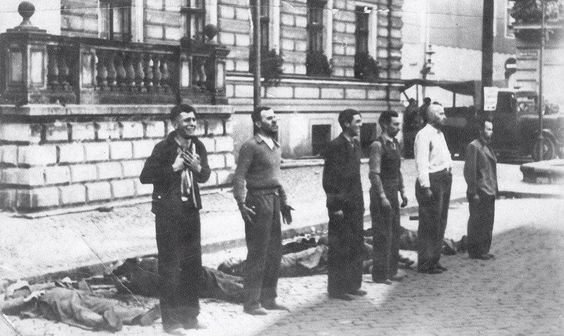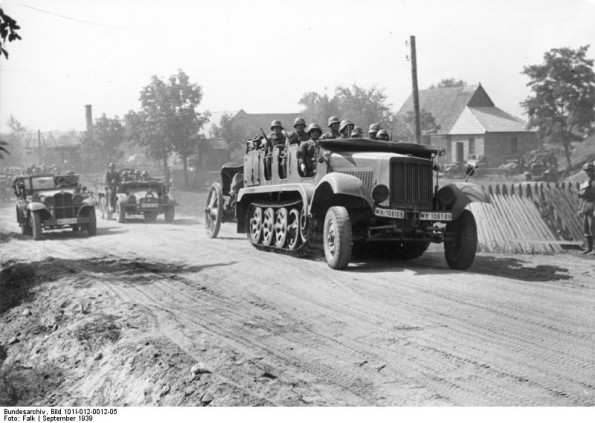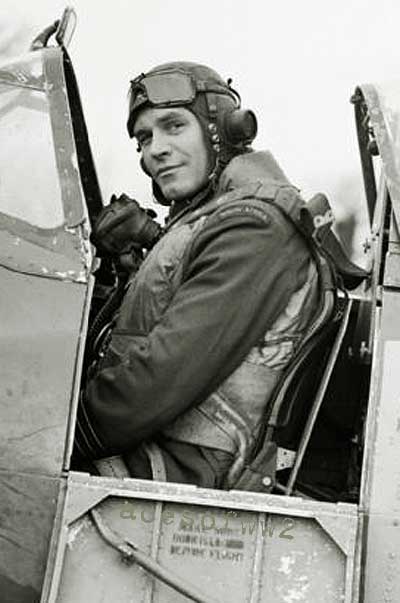Saturday 9 September 1939
 |
| “The execution of the locals by German soldiers. Bydgoszcz. The Polish Republic. September 9, 1939.” (German town name: Bromberg). |
Battle of Poland: On the evening of September 9, 1939, the Polish Army Poznań and Army Pomorze (about 10 divisions between them) under General Tadeusz Kutrzeba attack the German 8th Army (Johannes Blaskowitz). This is a grandly heroic and utterly futile attempt to turn the campaign around.
The 8th Army has been advancing east along the Bzura River toward Warsaw and is protected on its flank only by the 30th Infantry Division, which is stretched over 30 km. The attack is an immediate success, with the Germans suffering 1500 casualties and losing 3000 men as prisoners. The 8th Army is thrown back 20 km along the line, and the Poles recapture several towns (Łęczyca, Piątek, and Góra Świętej Małgorzaty). Some histories claim that the Wehrmacht was never forced to give ground before Operation Barbarossa, but this is a clear instance of German forces doing that in Poland.
Elsewhere, General Wiktor Thommée's Piotrków Group (Thommée's Group) retreats to avoid encirclement and the German Tenth Army occupies Łódź.
The XVI Panzer Corps continues attacking Warsaw from the southeast but makes no progress.
German units attack the Hel Peninsula, which is the site of a Polish naval base and effective coastal batteries. The Peninsula is defended by the soldiers of the Fortified Region Hel unit (Helski Rejon Umocniony), part of the Coastal Defence Group (Grupa Obrony Wybrzeża) under Włodzimierz Steyer,
European Air Operations: The RAF drops leaflets over Cassel and nearby locations in central Germany, its fifth propaganda mission of the war. The RAF also carries out a raid on a German airbase on the island of Sylt, off the west coast of Schleswig-Holstein.
Battle of the Atlantic: Several more British and French merchant ships are torpedoed.
German High Command: Adolf Hitler takes note of the tentative French invasion of the Saar and. He issues Directive No. 3, "Transfer of Forces from Poland to the West." He is doing in reverse what Helmuth von Moltke did during the First Battle of the Marne in September 1914, weakening the main attack by transferring troops to buttress the weaker front.
Hermann Goering extends his sporadic attempts at peacemaking with an address from a Berlin armaments factory. As usual, he mixes his peaceful overtures with bluster. “No enemy bomber can reach the Ruhr,” he guarantees. “If one reaches the Ruhr, my name is not Göring. You can call me Meyer." Ordinary Germans take to calling the ubiquitous air raid sirens "Meyer's Trumpets" as a result. The absurd promise becomes an underground joke (on both sides of the conflict) that Goering himself somewhat uncharacteristically plays into occasionally.
German/Soviet Relations: Apparently reacting to erroneous press reports and a German public radio announcement, Soviet Foreign Minister Molotov somewhat prematurely congratulates the Germans on their success in Warsaw. In response to an "invitation" from Ribbentrop to advance to the Narew as agreed to under the Ribbentrop/Molotov Pact, he states that the Soviets will invade to claim their territory "within the next several days."
Western Front: The French Operation Saar continues, but few gains are made against virtually no resistance. The French have occupied about three square miles (5 km) of this key coal-producing area, but continue to seem hesitant. The area is deserted, mined and booby-trapped.
The BEF receives the last of its full complement of 13 RAF squadrons.
War Crimes: German soldiers line locals up and shoot them in Bromberg (Bydgoszcz). This appears to be in reprisal for Polish shootings of ethnic German civilians by Polish snipers in previous days. The entire incident is very confused and modern scholarship still has not established a definitive timeline. In one accepted version, some ethnic German irregulars/saboteurs/locals fired on retreating Polish troops (Army Pomorze's 9th, 15th, and 27th Infantry Divisions), who returned fire. There were casualties on both sides, but the Polish troops accounted for many more civilians (around 40–50 Poles and between 100 to 300 Germans were killed). The advancing Germans became infuriated when they found the civilian bodies and then took reprisals against Polish civilians. This entire sequence is the "Bloody Sunday" episode.
Belgium: BEF forces become the first to encroach on Belgian territory when some RAF fighters meet some Belgian fighters. Apologies are quickly offered for this diplomatic incident.
Canadian Government: in a perfunctory vote, the Canadian Parliament ratifies Prime Minister Mackenzie King's declaration of war on Germany.
American Homefront: Patricia Donnelly, Miss Michigan, is crowned Miss America 1939. The Glenn Miller Band with Ray Eberle tops the pop charts with their version of "Over the Rainbow."
September 2, 1939: Danzig Annexed
September 3, 1939: France, Great Britain Declare War
September 4, 1939: First RAF Raid
September 5, 1939: The US Stays Out
September 6, 1939: Battle of Barking Creek
September 7, 1939: Polish HQ Bugs Out
September 8, 1939: War Crimes in Poland
September 9, 1939: The Empire Strikes Back
September 10, 1939: The Germans Break Out
September 11, 1939: Battle of Kałuszyn
September 12, 1939: The French Chicken Out
September 13, 1939: The Battle of Modlin
September 14, 1939: Germany Captures Gdynia
September 15, 1939: Warsaw Surrounded
September 16, 1939: Battle of Jaworów
September 17, 1939: Soviets Invade Poland
September 18, 1939: Lublin Falls
September 19, 1939: Germans, Soviets Hook Up
September 20, 1939: the Kraków Army Surrenders
September 21, 1939: Romania Convulses
September 22, 1939: Joint Soviet-German Military Parade
September 23, 1939: The Panama Conference
September 24, 1939: The Luftwaffe Bombs Warsaw
September 25, 1939: Black Monday for Warsaw
September 26, 1939: Warsaw on the Ropes
September 27, 1939: Hitler Decides to Invade France
September 28, 1939: Warsaw Capitulates
September 29, 1939: Modlin Fortress Falls
September 30, 1939: Graf Spee on the Loose
2019
The 8th Army has been advancing east along the Bzura River toward Warsaw and is protected on its flank only by the 30th Infantry Division, which is stretched over 30 km. The attack is an immediate success, with the Germans suffering 1500 casualties and losing 3000 men as prisoners. The 8th Army is thrown back 20 km along the line, and the Poles recapture several towns (Łęczyca, Piątek, and Góra Świętej Małgorzaty). Some histories claim that the Wehrmacht was never forced to give ground before Operation Barbarossa, but this is a clear instance of German forces doing that in Poland.
Elsewhere, General Wiktor Thommée's Piotrków Group (Thommée's Group) retreats to avoid encirclement and the German Tenth Army occupies Łódź.
The XVI Panzer Corps continues attacking Warsaw from the southeast but makes no progress.
German units attack the Hel Peninsula, which is the site of a Polish naval base and effective coastal batteries. The Peninsula is defended by the soldiers of the Fortified Region Hel unit (Helski Rejon Umocniony), part of the Coastal Defence Group (Grupa Obrony Wybrzeża) under Włodzimierz Steyer,
European Air Operations: The RAF drops leaflets over Cassel and nearby locations in central Germany, its fifth propaganda mission of the war. The RAF also carries out a raid on a German airbase on the island of Sylt, off the west coast of Schleswig-Holstein.
Battle of the Atlantic: Several more British and French merchant ships are torpedoed.
German High Command: Adolf Hitler takes note of the tentative French invasion of the Saar and. He issues Directive No. 3, "Transfer of Forces from Poland to the West." He is doing in reverse what Helmuth von Moltke did during the First Battle of the Marne in September 1914, weakening the main attack by transferring troops to buttress the weaker front.
Hermann Goering extends his sporadic attempts at peacemaking with an address from a Berlin armaments factory. As usual, he mixes his peaceful overtures with bluster. “No enemy bomber can reach the Ruhr,” he guarantees. “If one reaches the Ruhr, my name is not Göring. You can call me Meyer." Ordinary Germans take to calling the ubiquitous air raid sirens "Meyer's Trumpets" as a result. The absurd promise becomes an underground joke (on both sides of the conflict) that Goering himself somewhat uncharacteristically plays into occasionally.
 |
| Goering's bombastic quotes became favorites additions to Allied bombers such as this Avro Lancaster. |
Western Front: The French Operation Saar continues, but few gains are made against virtually no resistance. The French have occupied about three square miles (5 km) of this key coal-producing area, but continue to seem hesitant. The area is deserted, mined and booby-trapped.
The BEF receives the last of its full complement of 13 RAF squadrons.
War Crimes: German soldiers line locals up and shoot them in Bromberg (Bydgoszcz). This appears to be in reprisal for Polish shootings of ethnic German civilians by Polish snipers in previous days. The entire incident is very confused and modern scholarship still has not established a definitive timeline. In one accepted version, some ethnic German irregulars/saboteurs/locals fired on retreating Polish troops (Army Pomorze's 9th, 15th, and 27th Infantry Divisions), who returned fire. There were casualties on both sides, but the Polish troops accounted for many more civilians (around 40–50 Poles and between 100 to 300 Germans were killed). The advancing Germans became infuriated when they found the civilian bodies and then took reprisals against Polish civilians. This entire sequence is the "Bloody Sunday" episode.
Belgium: BEF forces become the first to encroach on Belgian territory when some RAF fighters meet some Belgian fighters. Apologies are quickly offered for this diplomatic incident.
Canadian Government: in a perfunctory vote, the Canadian Parliament ratifies Prime Minister Mackenzie King's declaration of war on Germany.
American Homefront: Patricia Donnelly, Miss Michigan, is crowned Miss America 1939. The Glenn Miller Band with Ray Eberle tops the pop charts with their version of "Over the Rainbow."
 |
| Patricia Donnelly is crowned Miss America 1939 on 9 September 1939. |
September 1939
September 1, 1939: Invasion of PolandSeptember 2, 1939: Danzig Annexed
September 3, 1939: France, Great Britain Declare War
September 4, 1939: First RAF Raid
September 5, 1939: The US Stays Out
September 6, 1939: Battle of Barking Creek
September 7, 1939: Polish HQ Bugs Out
September 8, 1939: War Crimes in Poland
September 9, 1939: The Empire Strikes Back
September 10, 1939: The Germans Break Out
September 11, 1939: Battle of Kałuszyn
September 12, 1939: The French Chicken Out
September 13, 1939: The Battle of Modlin
September 14, 1939: Germany Captures Gdynia
September 15, 1939: Warsaw Surrounded
September 16, 1939: Battle of Jaworów
September 17, 1939: Soviets Invade Poland
September 18, 1939: Lublin Falls
September 19, 1939: Germans, Soviets Hook Up
September 20, 1939: the Kraków Army Surrenders
September 21, 1939: Romania Convulses
September 22, 1939: Joint Soviet-German Military Parade
September 23, 1939: The Panama Conference
September 24, 1939: The Luftwaffe Bombs Warsaw
September 25, 1939: Black Monday for Warsaw
September 26, 1939: Warsaw on the Ropes
September 27, 1939: Hitler Decides to Invade France
September 28, 1939: Warsaw Capitulates
September 29, 1939: Modlin Fortress Falls
September 30, 1939: Graf Spee on the Loose
2019


